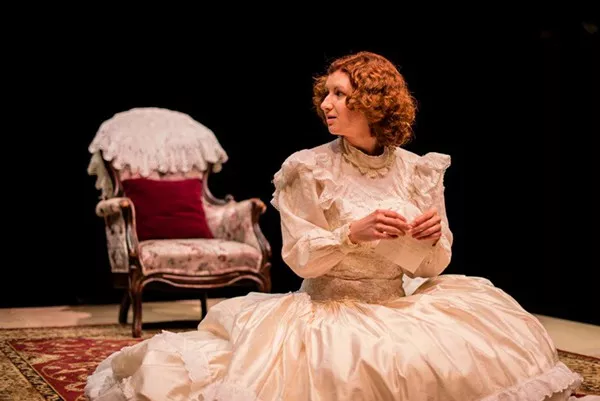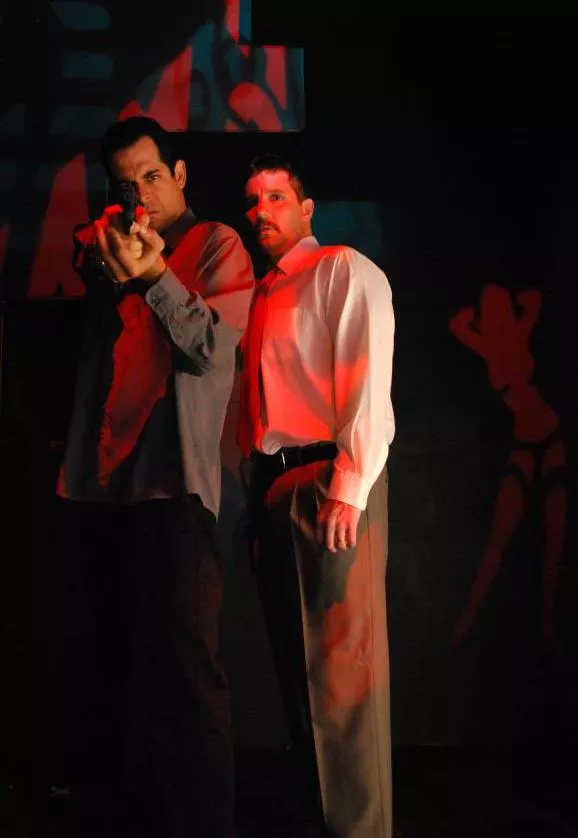The theater aggregation up in NoDa began on Memorial Day weekend, just before my wife Sue and I fled Speed Weeks for Spoleto Festival USA. Carolina Actors Studio Theatre opened a five-week run of The Edge of Our Bodies on Thursday and, instead of booking that one-woman show for Sunday matinees, layered on a double-bill. Eliza, a one-woman show based on the book of poems by Dede Wilson starts the afternoon at 2:30 - or it does if the lightbooth operator shows up on time - and an original choreopoem by Dee Abdullah, Under the Red Cloak, follows at 5 p.m.
That double-feature has one more showing this Sunday. But there's a fourth show running at CAST, and it's the best of them all. Keith Huff's A Steady Rain, the debut effort by 700 Miles South Productions, joined the rotation on the weekend after Memorial Day, with late-night 10 p.m. performances on Friday and Saturday nights through June 30. Four plays running at the same time in the same venue is a new all-time Charlotte record, I'd wager.
Directed by Michael Harris with nifty lighting design by Michael R. Simmons, Steady Rain creates a dark film noire flavor with just two characters, Chicago policemen Denny and Joey. One is more corrupt than the other. Denny is on-the-take, cheating on his wife, and an unapologetic racist who employs such choice epithets as "rice puppy" in categorizing suspects and victims. Trying to lay off the booze, Joey is reluctantly on-the-make with Denny's wife as the crooked cop digs himself into deeper and deeper trouble. Covering up for his partner's derelictions of duty is jeopardizing Joey's job as well.
Best buddies since childhood, there's a lot of past history between Denny and Joey coming to a boil after a mysterious attack on Denny's home nearly kills his son. Harris gets magnificent work from J.R. Adduci as Denny, even better here as the rogue cop than he was as Stanley Kowalski, and John C. Cunningham as Joey surpasses anything I've seen him do before, more humdrum and precariously controlled than I ever thought he could be.
Eliza sports the same throw-rug in the middle of its set as Edge of our Bodies and the same basic problem: a protagonist who cannot be heard at key points. The talkback with poet/playwright Wilson was far more audible than Pamela Freedy was as Eliza Moore Christie Parker. But as Freedy spins Eliza's tale of two husbands and nine children in 19th century New Orleans, it also becomes clear that Wilson has done too little with her book of poems to make it a completely satisfying drama. The denouement happens far too abruptly, without inevitability or power.

- Extra Medium Large Photography | copyright 2012 | Shannon J Hager
Produced by Matchett Enterprises and directed by the playwright, Under the Red Cloak borrows some of Simmons' lighting design for Steady Rain, but that's probably the biggest flaw in the production. According to Abdullah, Red Cloak was inspired by Anita Diamant's The Red Tent, but its kinship with For Colored Girls seems far more obvious. Instead of different colors of the same basic costume that we find in Ntozake Shange's rainbow celebration of black womanhood, all the women here are decked out in a diaphanous red. The opening poem, "I Am Blood/I Am Woman," keys the mood.
Songs by Greg James and Luqman Abdullah set this choreopoem apart, with fine singing from Namiah Potter (I hope I've picked the right spelling among the three in the playbill for this actress) and Carmen Coulter. Testimonies by the women are consistently compelling, but I must say I was distressed by repeated instances of mothers who allowed their husbands to abuse or rape their daughters. Resignation to your husband beating you is bad enough - as the old blues used to say, "Ain't nobody's business if I do" - but daughters should be able to count on their moms for protection from such odious predators.
Black women have important stories we should hear - comical, quirky and tragic. In Under the Red Cloak, they tell them, with direction from Abdullah that's as effective as her writing.

